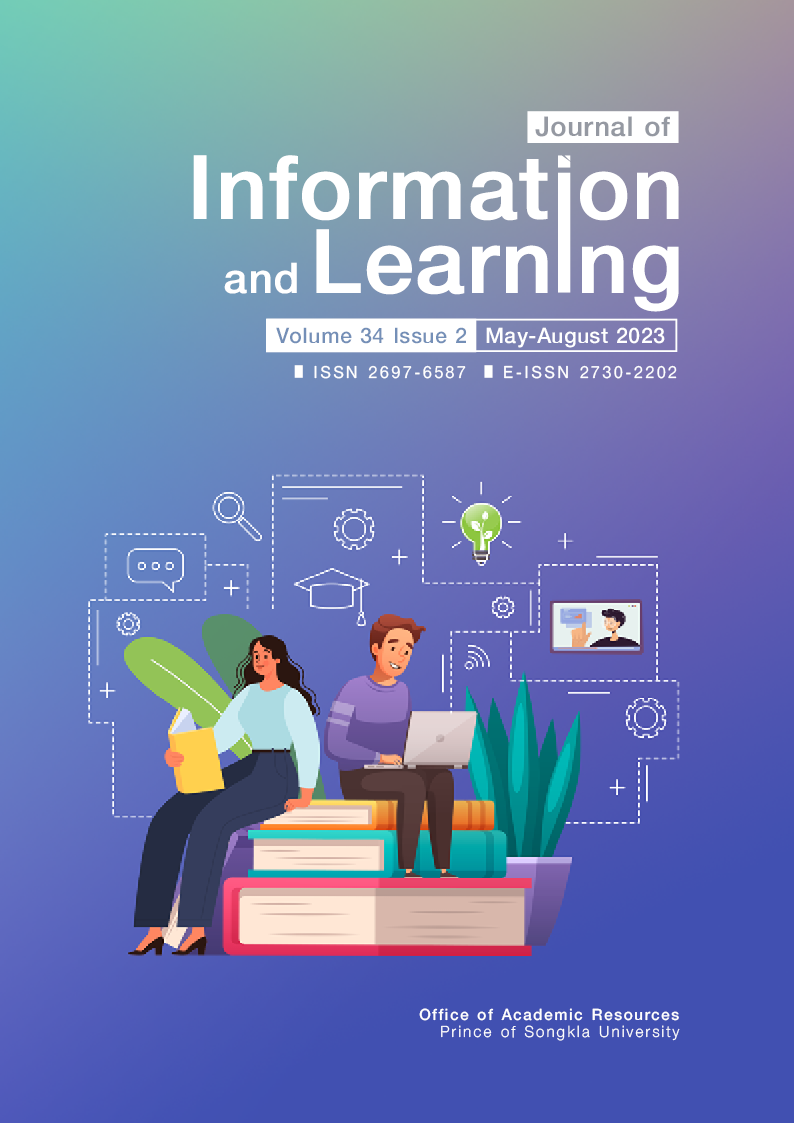Developing Indicators of Digital Technology Competencies of Student Teachers
Main Article Content
Abstract
The objectives of this research were: 1) to explore student teachers’ digital technology competencies and 2) to develop student teachers’ digital technology competency indicators. The sample population consisted of 1,854 student teachers selected by simple random sampling from higher education institutions offering degree programs in education. The research instruments consisted of a 5-level Likert student teachers’ digital technology competency assessment scale, whose content validity was evaluated by nine experts, and the discriminant power was analyzed with a reliability value of 0.99. The components were analyzed based on the survey. Data were analyzed using mean, and standard deviation and Pearson correlation coefficient.
The results revealed as follows. Student teachers’ digital technology competency indicators consisted of 5 components, namely knowledge and understanding of digital technology, digital technology learning management, digital technology use, access to digital technology, and digital technology creation. It was also found that student teachers' digital technology competency consisted of five competencies and 60 indicators as follows: Competency 1 (digital technology knowledge and understanding) consisting of 17 key indicators, Competency 2 (digital technology learning management) consisting of 11 key indicators, Competency 3 (digital technology usage) comprising 13 key indicators, Competency 4 (digital technology access) comprising 10 key indicators, and Competency 5 (digital technology creation) consisting of nine key indicators.
Article Details

This work is licensed under a Creative Commons Attribution-NonCommercial-NoDerivatives 4.0 International License.
The Journal of Information and Learning is operated by the Office of Academic Resources, Prince of Songkla University. All articles published in the journal are protected by Thailand copyright law. This copyright covers the exclusive rights to share, reproduce and distribute the article, including in electronic forms, reprints, translations, photographic reproductions, or similar. Authors own copyrights in the works they have created as well as the Office of Academic Resources. The Journal reserves the right to edit the language of papers accepted for publication for clarity and correctness, as well as to make formal changes to ensure compliance with the journal's guidelines. All authors must take public responsibility for the content of their paper.
References
Changkwanyeun, A., Kaewurai, K., Wongthai, W., & Lincharoen, A. (2021). Active learning approach to enhance digital citizenship. Journal of Education Naresuan University, 23(3), 452-465. https://so06.tci-thaijo.org/index.php/edujournal_nu/article/view/240431
Children and Youth Development. (2020). Children and youth development report. Faculty of Social Sciences, Kasetsart University.
Haleem, A., Javaid, M., Qadri, M. A., & Suman, R. (2022). Understanding the role of digital technologies in education: A review. Sustainable Operations and Computers, 3, 275-285. https://doi.org/10.1016/j.susoc.2022.05.004
Kaewurai, R., & Chaimin, C. (2019). Learning space for digital natives in academic library. Journal of Education Naresuan University, 21(4), 366-378. https://so06.tci-thaijo.org/index.php/edujournal_nu/article/view/152965
National statistical office ministry of digital economy and society. (2022). The 2022 household survey on the use of information and communication technology (quarter 1). National Statistical Office Thailand. http://www.nso.go.th/sites/2014en/Survey/ICT/Survey%20In%20Household/2022/full_report_q1_2022.pdf
Office of the Basic Education Commission. (2010). Teacher competency assessment manual office of the basic education commission. The Ministry of Education. Kurusapa Ladprao Publishing.
Ongardwanich, N. (2021). Development of digital competence of high school students in the era of Thailand 4.0. Journal of Education Naresuan University, 24(4), 177-187. https://so06.tci-thaijo.org/index.php/edujournal_nu/article/view/248922
Phakham, P., Intrasingh, S., & Assapaporn, N. (2021). Guidelines digital competence enhancement for undergraduate students of faculty of education, chiang mai university, in education 4.0 era. Journal of Graduate Research, 12(2), 119-131. https://so02.tci-thaijo.org/index.php/banditvijai/article/view/250240
Phitthayasenee, M., Sengsri, S., & Sirichaisin, K. (2020). Guidelines for the development of digital technology competency of teacher students Rajabhat university. Lampang Rajabhat University Journal, 9(1), 64-73. https://so04.tci-thaijo.org/index.php/JLPRU/article/view/240660
Poldech, S. (2018). The competency in information and communication technology of preservice teachers, Faculty of Education at Buriram Rajabhat University [Conference presentation]. 2nd National and International Research Conference 2018: NIRC II 2018, Buriram, Thailand. https://bit.ly/47mF6SB
Putwattana, P. (2021). Learning management for developing learners in digital age. Journal of Learning Innovation and Technology (JLIT), 1(2), 1-11. https://so06.tci-thaijo.org/index.php/JLIT/article/view/253671
Wisetsat, C., & Wisetsat, W. (2020). A need study to enhance pre-service teachers’ digital competencies. Journal of Yala Rajabhat University, 15(1), 105-116. https://so04.tci-thaijo.org/index.php/yru_human/article/view/170036
UNESCO. (2011). UNESCO ICT competency framework for teachers. UNESCO. https://unesdoc.unesco.org/ark:/48223/pf0000265721


